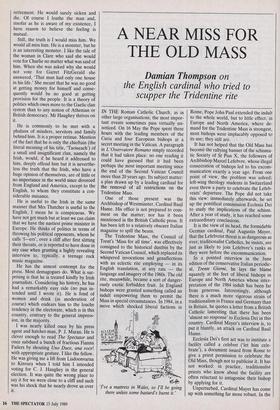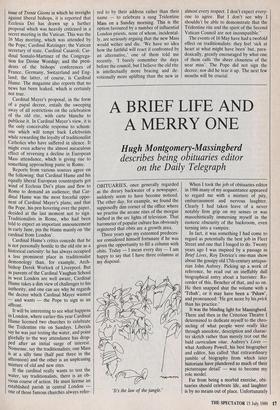A NEAR MISS FOR THE OLD MASS
Damian Thompson on
the English cardinal who tried to scupper the Tridentine rite
IN THE Roman Catholic Church, as in other large organisations, the most impor- tant events sometimes pass virtually un- noticed. On 16 May the Pope spent three hours with the leading members of the Curia and four European bishops at a secret meeting in the Vatican. A paragraph in L'Osservatore Romano simply recorded that it had taken place: no one reading it could have guessed that it had been perhaps the most important meeting since the end of the Second Vatican Council more than 20 years ago. Its subject matter: a plan drawn up by a leading cardinal for the removal of all restrictions on the Tridentine Mass.
One of those present was the Archbishop of Westminster, Cardinal Basil Hume. His office is not prepared to com- ment on the matter; nor has it been mentioned in the British Catholic press. It has been left to a relatively obscure Italian magazine to spill the beans.
The Tridentine Mass, the Council of Trent's 'Mass for all time', was effectively consigned to the historical dustbin by the Second Vatican Council, which replaced its whispered invocations and genuflections with an eclectic rite employing — in its English translation, at any rate — the language and imagery of the 1960s. The old rite, meanwhile, became a sort of danger- ously exotic forbidden fruit. In England bishops were granted something called an indult empowering them to permit the Mass in special circumstances. In 1984, in a move which shocked liberal factions in `I've a mattress in Wales, so I'll be going there unless some bastard's burnt it.' Rome, Pope John Paul extended the indult to the whole world, but to little effect; in Europe and North America, where de- mand for the Tridentine Mass is strongest, most bishops were implacably opposed to its use; they still are. • It has not helped that the Old Mass has become the rallying banner of the schisma- tic Society of St Pius X, the followers of Archbishop Marcel Lefebvre, whose illegal consecration of bishops led to his excom- munication exactly a year ago. From one point of view, the problem was solved; left-wing theology students in Switzerland even threw a party to celebrate the Lefeb- vrists' departure. The Pope did not take this view: immediately afterwards, he set up the pontifical commission Ecclesia Dei to study the implications of the schism. After a year of study, it has reached some extraordinary conclusions.
It is the view of its head, the formidable German cardinal, Paul Augustin Mayer, that the Lefebvrist threat is as dangerous as ever; traditionalist Catholics, he insists, are just as likely to join Lefebvre's ranks as they were before the excommunication.
In a pointed interview in the June edition of the conservative Italian periodic- al, Trente Giorni, he lays the blame squarely at the feet of liberal bishops in Europe and North America whose inter- pretation of the 1984 indult has been far from generous. Interestingly, although there is a much more vigorous strain of traditionalism in France and Germany than in Britain, he quotes a letter from a British Catholic lamenting that there has been `almost no response' to Ecclesia Dei in this country. Cardinal Mayer's interview is, to put it bluntly, an attack on Cardinal Basil Hume.
Ecclesia Dei's first act was to institute a facility called a celebret (let him cele- brate'), a document issued from Rome to give a priest permission to celebrate the Old Mass, though not to publicise it. It has not worked: in practice, traditionalist priests who know about the facility are often reluctant to antagonise their bishop by applying for it.
Unperturbed, Cardinal Mayer has come up with something far more robust. In the issue of Trente Giorni in which he inveighs against liberal bishops, it is reported that Ecclesia Dei has drawn up a further proposal which was heavily criticised in a secret meeting in the Vatican. This was the 16 May meeting, which was attended by the Pope; Cardinal Ratzinger; the Vatican secretary of state, Cardinal Casaroli; Car- dinal Somalo-Martinez of the Congrega- tion for Divine Worship; and the presi- dents of the bishops' conferences of France, Germany, Switzerland and Eng- land; the latter, of course, is Cardinal Flume. The magazine also reports that no news has been leaked, which is certainly not true.
Cardinal Mayer's proposal, in the form of a papal decree, entails the sweeping away of all restrictions on the celebration of the old rite, with carte blanche to publicise it. In Cardinal Mayer's view, it is the only conceivable response to schism: one which will tempt back Lefebvrists while rewarding the loyalty of traditionalist Catholics who have suffered in silence. It might even achieve the almost miraculous effect of reversing a decline in European Mass attendance, which is giving rise to something approaching panic in Rome.
Reports from various sources agree on the following: that Cardinal Hume and his equally liberal European counterparts got wind of Ecclesia Dei's plans and flew to Rome to demand an audience; that Car- dinal Hume was the most forceful oppo- nent of Cardinal Mayer's plans; and that the Pope, his pen hovering over the paper, decided at the last moment not to sign. Traditionalists in Rome, who had been told to expect an important announcement in early June, pin the blame mainly on 'the cardinal from London'.
Cardinal Hume's critics concede that he is not personally hostile to the old rite as a historical curiosity: he has always occupied a less prominent place in traditionalist demonology than, for example, Arch- bishop Derek Worlock of Liverpool. But as parents of the Cardinal Vaughan School in west London are well aware, Cardinal Hume takes a dim view of challenges to his authority, and one can see why he regards the decree which Cardinal Mayer wanted — and wants — the Pope to sign as an affront.
It will be interesting to see what happens in London, where earlier this year Cardinal Hume licensed two churches to celebrate the Tridentine rite on Sundays. Liberals say he was just testing the water, and point gleefully to the way attendance has drop- ped after an initial surge of interest. Nonsense, say the traditionalists; one Mass Is at a silly time (half past three in the afternoon) and the other is an unpleasing mixture of old and new rites.
If the cardinal really wants to test the water, say traditionalists, there is an ob- vious course of action. He must license an established parish in central London one of those famous churches always refer-
red to by their address rather than their name — to celebrate a sung Tridentine Mass on a Sunday morning. This is the option favoured by a number of influential London priests, none of whom, incidental- ly, are seriously arguing that the new Mass would wither and die. 'We have no idea how the faithful will react if confronted by an alternative,' one of them told me recently. 'I barely remember the days before the council, but I believe the old rite is intellectually more bracing and de- votionally more uplifting than the new in almost every respect. I don't expect every- one to agree. But I don't see why I shouldn't be able to demonstrate that the Tridentine rite and the spirit of the Second Vatican Council are not incompatible.'
The events of 16 May have had a twofold effect on traditionalists: they feel 'sick at heart at what might have been' but, para- doxically, greatly encouraged by what one of them calls 'the sheer closeness of the near miss'. The Pope did not sign the decree; nor did he tear it up. The next few months will be crucial,



















































 Previous page
Previous page